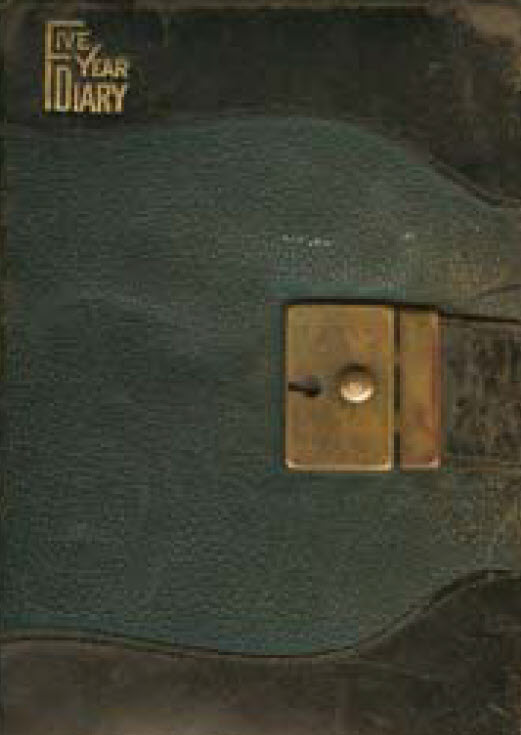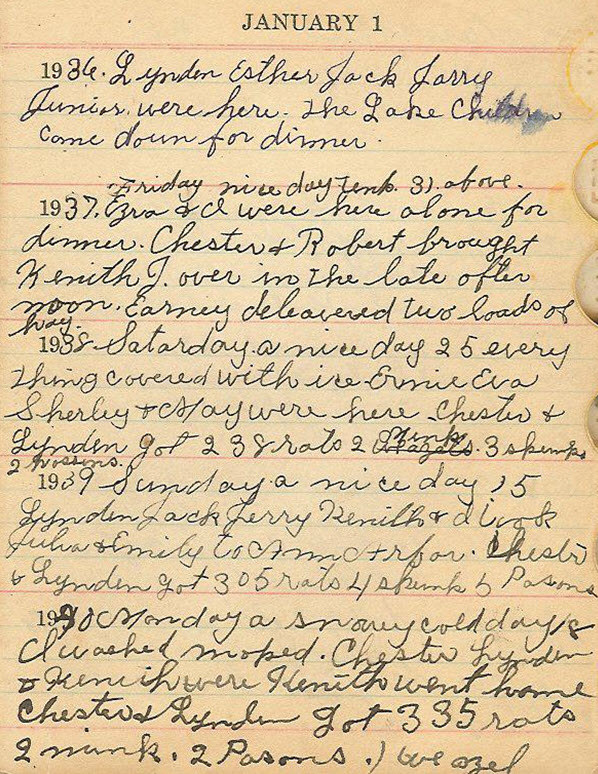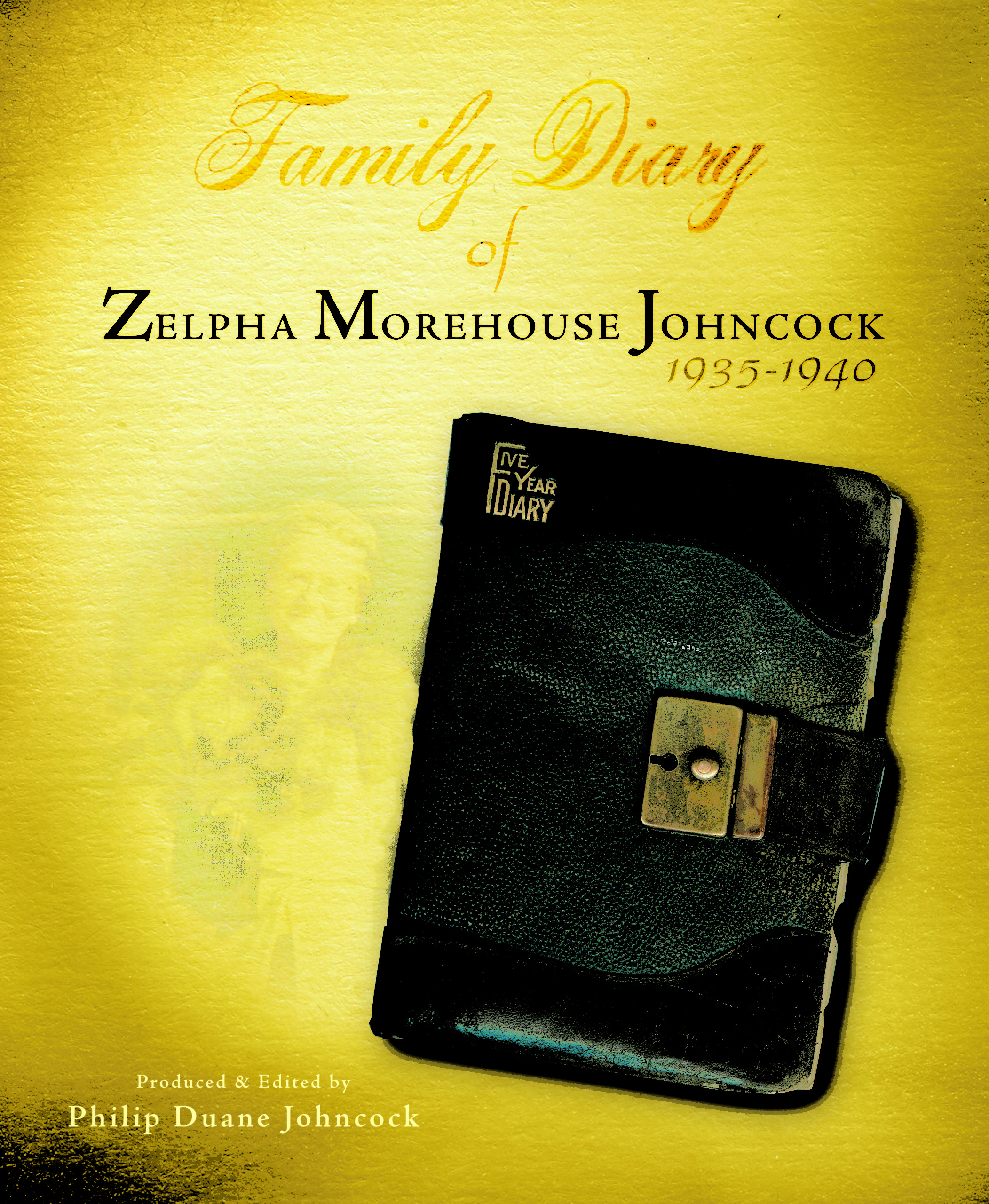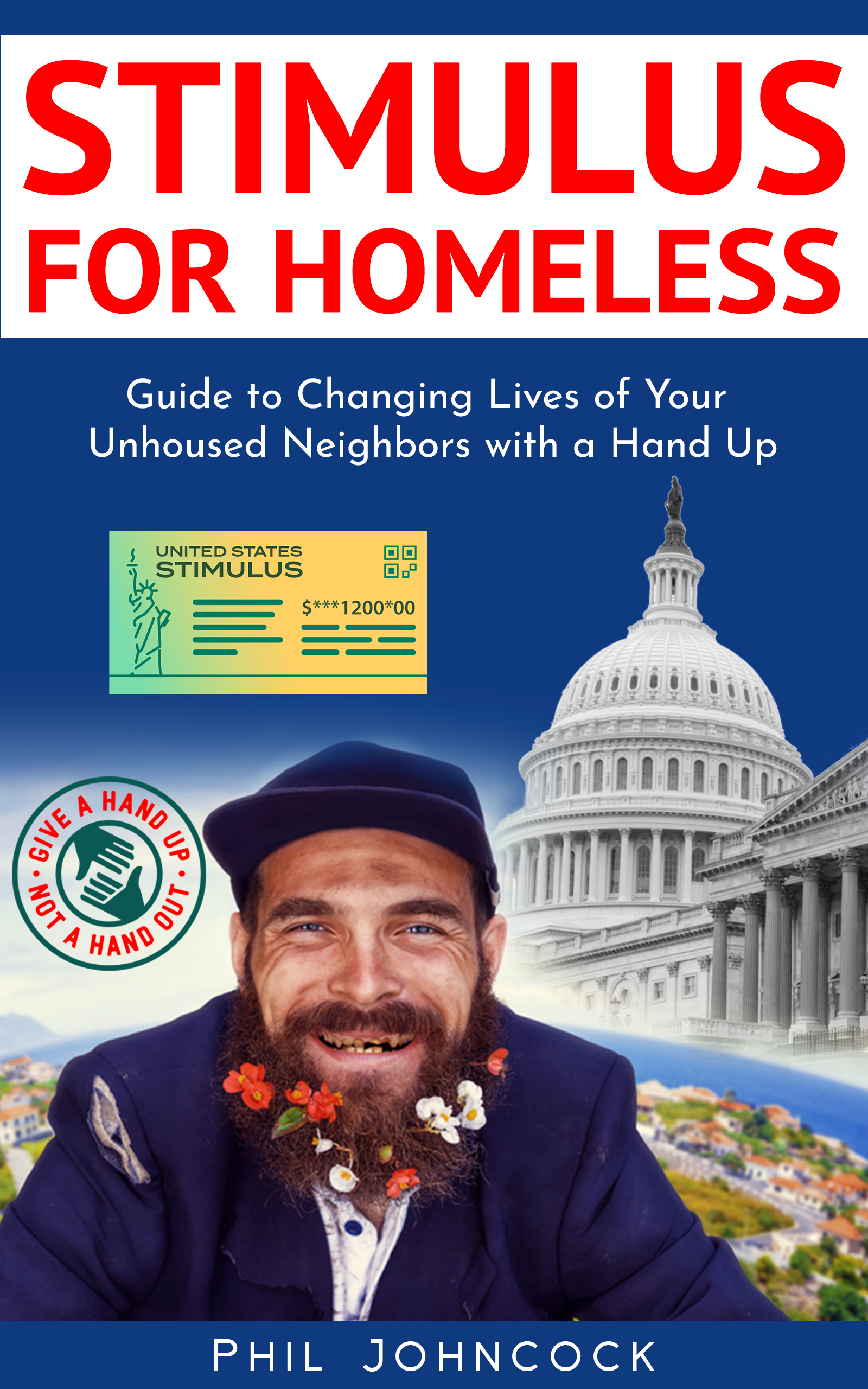The two books I never should have written are:
Why not?
Let’s start with Zelpha’s diary.
First, it’s a miracle I got Zelpha’s diary to begin with. At the estate sale for Esther and Lynden Johncock, Sr, my grandparents (Lynden is Zelpha’s son), my mother saw a card table full of nick-nacks, all for a nickel. What a deal, right!
When mom got home and looked in the bag, this small locked diary caught her eye with the words FIVE YEAR DIARY on the front cover.
The lock must have broken a long time ago undoubtedly from thousands of entries by its author. The lever pushes up. The latch releases. The strap unhooks, and it opens.
Handwritten numbers on the first page don’t seem to mean anything.
On the next page, publishers of the blank FIVE YEAR DIARY say that within these pages are “… recorded important events most worthy of remembrance.”
A few pages later appear a clue about the author: Zelpha Johncock Morehouse, born 1886, dies November 1950. Probably Grandma Esther’s handwriting.
I don’t know how much of the diary mom read that first time when she thumbed through it. There are 5 entries per page. Take a look at January 1:
You can see right away how tiny the writing is and how challenging it is to read. To make the reader’s job easier, it would need to be typed.
For example, the entry for January 1, 1940, reads…
Monday. A snowy, cold day. 18. I washed, mopped. Cheater, Lynden (Sr) and Kenith were (here). Kenith went home. Chester and Lynden (Sr) got (trapped) 335 rats, 2 mink, 2 possum, 1 weasel.
Mom gave Zelpha’s diary to me shortly after she found it. As I thumbed through it, I thought, “This would be a good book to be shared with my family IF it were typed.”
So, I started typing up the entries. This was no small undertaking. It was a tedious process.
In fact, it took me 10 years to type up 50% of that little diary. Every year, my New Year’s resolution was the same: finish the diary. At the rate I was going, I knew I would not finish unless I changed my approach.
A good reason to give up.
Then, the idea came. What if I hired a student from the high school business class to type the rest of the book. She would probably enjoy typing in class and making a little extra money. I know I did in high school when college students would bring their papers into my typing classes and pay me to type them.
The student’s help freed up my time to travel to Michigan to interview my father and Uncle Lyndren Jr. who were still alive and knew their Grandma Zelpha. I asked them questions about Zelpha and events from pages of her diary which gave valuable commentary about farm life during the post-Depression era in Southwestern Michigan. The high school student transcribed the interviews, too.
The book is not destined for many sales though I did get some from museums in Michigan and a few family members.
The real payoff came, though, from an unforeseeable source: Lester, a farm hand mentioned 187 times in Zelpha’s diary.
Sadly, Lester died at age 94 before I could interview him. I do know, though, that the book touched him. My mom gave Lester a copy of the book. I heard that he carried it around with him under his arms like it was his bible. The spine was frayed from use and many pages dog eared.
Lester’s delight with the book that documented much of his working life: priceless!
Stimulus for Homeless is the second book that I should never have published.
When COVID-19 hit, Oregon Governor Brown declared a “shelter at home” order. This is great if you had a home in which to shelter. What about the homeless? Where do they shelter?
Well, it just so happened I was managing a Warming Center for the homeless in Grants Pass on the coldest nights. When the pandemic hit, the Governor’s declaration and additional funding secured by the United Community Action Network (UCAN) allowed Rogue Retreat to open the Warming Center seven-nights-a-week starting April 1.
With the small amount of stability that the Center brought, Rogue Retreat and UCAN staff began to assist guests with “essential services” like health insurance, SNAP food stamps, IDs, mail boxes, housing prep, resumes, job prep, even free phones!
Then, when the CARES Act was passed, 69% of our guests did not know they were eligible or even how to get their first stimulus checks. We helped them get $30,000 in stimulus checks.
The truly remarkable thing, though, is how they spent their money. One guest hired an attorney to take care of legal issues to get back on his feet. Another guest bought a truck while a third guest used his check to pay for gas and buy food. When they couldn’t find a place to sleep legally, one slept in the front seat. The other slept in the back. A fourth guest bought a bicycle to travel from the shelter to work and back again.
Wow! Stimulus checks helping people restore their lives.
The problem is that many communities like ours do not know how to help their homeless neighbors get their stimulus checks. So, I wrote Stimulus for Homeless. It introduces a process for getting checks and how to even help getting essential services. It even shows how to create a spending plan while homeless individuals wait for their stimulus checks.
I donated 86.5 hours of my time to write and publish the paperback and audiobook. I donated $1,564.28 out of my own pocket to the project. Like with Zelpha’s Diary, I knew this book would not likely be a best-seller. In fact, you could say that it was a poor return on investment of time and money.
Then, something miraculous happened. A new friend and colleague from the small coastal town of Brookings, Oregon, left a 5-star review on Amazon two weeks ago:
“I run a small NPO that provides street outreach to unsheltered community members and home visits to those who are precariously housed. Our team read this book at the end of 2020, just before the first stimulus deadline had passed. This gave us ideas on how to help them create a spending plan and what debt they might have. We realized we needed to make a dedicated effort to get everyone signed up for the stimulus and planned a week-long event. To date, we’ve assisted our community members in receiving more than $40,000 in stimulus money. We also applied this thinking to those we helped with unemployment and other emergency benefits. This is a great book for small and large organizations, or even churches and individual groups.”
Perhaps I never should have written Stimulus for Homeless or the Family Diary of Zelpha Morehouse Johncock.
But, I’m sure glad I did!
?





